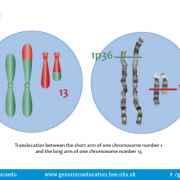Definition
The exchange of genetic material between two different chromosomes.
Use in clinical context
Reciprocal translocations occur when part of one chromosome is exchanged with another. Translocations can disrupt functional parts of the genome and have implications for protein production with phenotypic consequences.
Reciprocal translocations are usually balanced and so may not have apparent functional implications. However, they can become unbalanced in the parents’ offspring if the pair of chromosomes where genetic material has been exchanged is not inherited together. Unbalanced translocations can result in missing genes or extra copies of genes which can have clinical impact.
It is possible to see large translocations using a karyotyping. Smaller translocations can be detected using microarrays and sequencing.
Related terms
Chromosome | Deoxyribonucleic acid (DNA) | Gene | Genetic/genomic variation | Genome | Karyotype | Microarray | Phenotype | Protein | Sequence | Translocation



